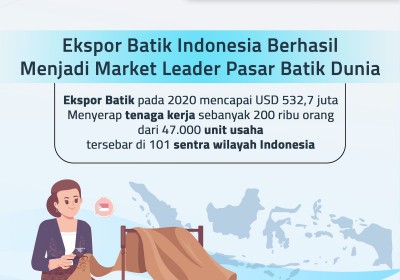Batik Industry Exports Currently Reach US$533 Million and Employs 200,000 Workers
October 16, 2021
JAKARTA – As one of the sectors that contributes the most to the economy, the batik industry is dominated by small-to-medium scale industries (IKM) that have employed as many as 200,000 people across 47,000 businesses throughout 101 regions in Indonesia.
“The batik industry is part of the textiles industry, which is also one of Indonesia’s leading economic sectors and is at the forefront of implementing the Making Indonesia 4.0 roadmap,” Industry Minister (Menperin) Agus Gumiwang Kartasasmita said in an official statement on Wednesday (6/10).
Minister Agus noted that the batik industry is considered a priority sector by the government because it is seen to have a major role in strengthening the economy, especially due to the fact that batik products have seen substantial demand throughout many foreign markets.
Data from the Kemenperin revealed that batik exports in 2020 reached US$532.7 million and managed to reach US$157.8 million in the first quarter of 2021 alone, making the batik industry vital to Indonesia’s economic standing in the world.
Adding the fact that UNESCO has already designated Indonesian batik as a “world heritage” in the Masterpieces of the Oral and Intangible Heritage of Humanity field. Batik is also an art that is highly practiced and highly sought after in Indonesia and further drives the creative industry.
As outlined in Presidential Decree No.33/2009, the government has named October 2 as “National Batik Day”, as a way to help preserve awareness of batik in Indonesian minds and encourage its growth.
“We believe that the preservation of batik as a culture, as part of the Indonesian identity, is closely related to the presence of the batik industry itself. The industry is increasingly competitive and are able to produce high-quality products that are always in-demand, at affordable prices and on every level of the market, with producers almost always recording good profits,” Minister Agus said.
He added that the development of the batik industry in Indonesia must be oriented towards the direction of the country’s sovereign industrial development, namely industrial development that optimizes the presence of domestic resources as development stakeholders.
“Advanced and empowered industries, namely those that have competitive advantages and market dominance, are able to take advantage of opportunities presented today, especially those involving technology. An industry that is fair and inclusive is an industry whose benefits can be felt by all levels of society,” the Minister said.
Although still in the midst of a productivity-halting pandemic, it does not mean that the industry’s productivity and creativity should wane. Minister Agus hopes that IKM actors will continue to operate their businesses consistently and sustainably. Because, with a large number of businesses spread out throughout the country, the batik industry is able to become a driving force for the regional economy and has the potential to be a lever and stimulant for IKMs nationwide.
Indonesia’s Research Institutions Supporting the Development of the Electric Vehicle Industry
Indonesian Muslim Fashion and Cosmetics IKMs Shine at Dubai World Expo 2020
Govt Steps Up UMKM Transformation Efforts in the Midst of Pandemic Slowdown
Govt Encourages Promotion of IKM Products in Digital Era
Government Begins Developing Maritime Training Center in Makassar
Tweets by IDDevForum
